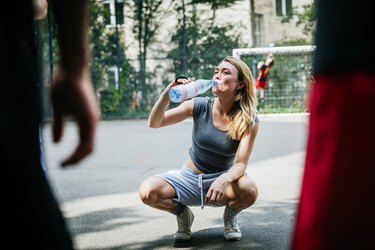
It happens many times a day, often almost unconsciously — you reach for a glass of water and take a sip. After that first swallow, the body begins the process of water digestion almost immediately. The liquid gets used, the waste is sorted out and it's released during your next trip to the bathroom.
It turns out that it's a journey with a lot of twists and turns on the road to water digestion — literally. After researchers traced the route of a sip of water throughout the body, they discovered that the speed at which water is digested depends on whether or not a person has recently eaten, noted a small study of 36 participants published in the European Journal of Applied Physiology in June 2012.
Video of the Day
Video of the Day
Tip
It can take anywhere from five minutes to two hours to digest water, depending on what's already in your stomach.
Read more: How Can I Tell When My Body is Hydrated?
Empty or Full Stomach
Water that's consumed on an empty stomach passes through the stomach directly into the large intestine, entering the bloodstream within five minutes of that first sip, according to the study. In fact, the researchers found that water digestion happens more quickly in an empty system than solid food.
Read more: What to Drink and When to Drink it
If the water is being consumed during or after a meal, it can take anywhere from 45 minutes to 2 hours for the stomach to digest the food, bring the water along with it and for that water to be fully absorbed into the bloodstream.
However, drinking with meals does have a benefit, as the study showed that water consumed during or after taking in solid food mixes in with the food and aids digestion more quickly. Drinking water with meals, in fact, is a good way to speed up overall digestion.
The study recruited volunteers to drink ordinary water that included deuterium, a hydrogen isotope, that enabled researchers to track each gulp throughout the body. The water started showing up in the bloodstream within five minutes; half was absorbed in 11 to 13 minutes, and the remainder was completely absorbed within 75 to 120 minutes.
As Water Digests
The Mayo Clinic notes that water has a number of important jobs throughout the body, including the ability to lubricate joints, deliver oxygen through the blood, keep skin healthy, regulate body temperature, help the digestive system work, flush away bodily wastes, maintain blood pressure and more. Drinking enough fluids and eating foods high in water content can ensure you keep a healthy body water percentage. If you're sick, you might need even more water.
Consumed beverages also are used to create mucus and saliva. Most people produce 2 pints of saliva a day, which is enough to fill two soda cans. Once the body has completed the water digestion it needs to function efficiently, it starts eliminating the excess. However, just a small percentage of the water you drink, approximately 20 percent, on average, ever makes it to the bladder.
A healthy bladder will usually hold about 1 to 1 1/2 cups of urine before the urge to urinate is signaled. Healthy adults pass about a quart and a half of urine through the bladder and out of the body each day, according to the National Institute on Aging. If you feel the need to go — do it. The muscles of an overfilled bladder can be weakened, and holding your bladder may contribute to urinary tract infections.
Additionally, perspiration and respiration — otherwise known as sweating and breathing — account for about 21 ounces a day each.
- European Journal of Applied Physiology: "Pharmacokinetic Analysis of Absorption, Distribution and Disappearance of Ingested Water Labeled with D₂O in Humans"
- Vivo Pathophysiology (Colorado State University): "Absorption of Water and Electrolytes"
- Mayo Clinic: "Water: Essential to Your Body"
- Mayo Clinic: "See How Your Digestive System Works"
- National Institute on Aging: "13 Tips to Keep Your Bladder Healthy"
- American Academy of Family Physicians: "Artificial Hydration and Nutrition"